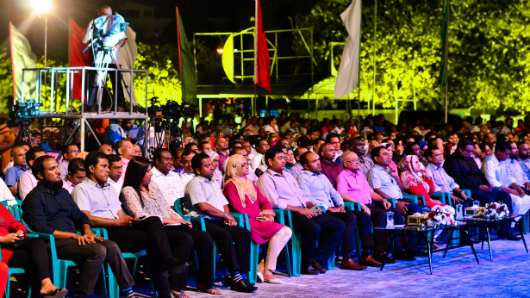The Maldives’ economy can sustainably and inclusively enhance development through the tourism industry, former President Mohamed Nasheed has told the Asia-Pacific Business Forum.
“The millionaire’s dream, and the Maldivian’s reality can co-exist and create a sustainable development model,” Nasheed told the forum in Colombo.
Describing the success of the guest house tourism model, he told stakeholders from the 53 member states that the exclusive one-island one-resort model has failed to benefit small island communities sufficiently.
“This model worked well for some. It worked for the resort owners and tour operators. And it worked for the central government, who profited handsomely from leasing islands for resort development. But had limited impact on the average Maldivian.”
The success of the tourism industry – dependant on 109 resorts – has seen the country’s per capita GDP double since 2001, now contributing around 35 percent to direct revenue.
Following alterations to tourism policy during Nasheed’s time in office (2008 – 2012) guest houses on inhabited islands have increased almost ten fold over the past five years.
While efforts to further develop the model are continuing with the Addu City guesthouse project, the government has introduced its own integrated resort development concept with a pilot project in Laamu atoll.
The government has touted the project as way to “responsibly diversify” the tourism product while protecting the industry’s high-end luxury image, though critics have questioned the benefit to smaller communities.
Giving the keynote speech at the three-day forum in Colombo, Nasheed said that the success of guest houses had demonstrated that they could bring sustainable businesses to the islands.
“By exploring new policy options – and dealing with key issues such as accessibility, waste or energy – we can build stronger, more sustainable, more inclusive economies,” he said.
He noted that the “ultimate guarantor of success”, however, remained the response to climate change.
“Often, climate change adaptation is the single biggest budget item in small island states. And on current projections that is not expected to get any smaller. So we should support ambitious action internationally, but we can also pursue cleaner development at home.”
Describing the technology of the fossil fuel industry as “Victorian”, Nasheed said that carbon neutrality was possible – as demonstrated by the growing use of solar power in the Maldives, as well as renewable technologies in other small island states.
“The sun is not just for the tourists to enjoy. It is also our biggest energy resource,” he added. “The ocean that surrounds our islands and the sun that shines on us is the future of our survival.”
The government has recently announced a five-year target to generate 30 percent of electricity used during daylight hours in the 196 inhabited islands of the Maldives from renewable energy sources.
Other speakers at this week’s forum include Sri Lankan President Mahinda Rajapaksa, Vice President of Hitachi Yasuo Tanabe, and Vice President of the KMSD Asian Development Bank Bondu N. Lohani.
The forum – first held in 2004 – aims this year to discover opportunities for enhancing interregional connectivity and investment within the context of inclusive and sustainable development.
Related to this story
Government launches guest house island project
How will guest house islands benefit the community?
Addu City Council reveals plans to develop 2000 guesthouse beds
Q&A: Minister of Tourism Ahmed Adeeb

